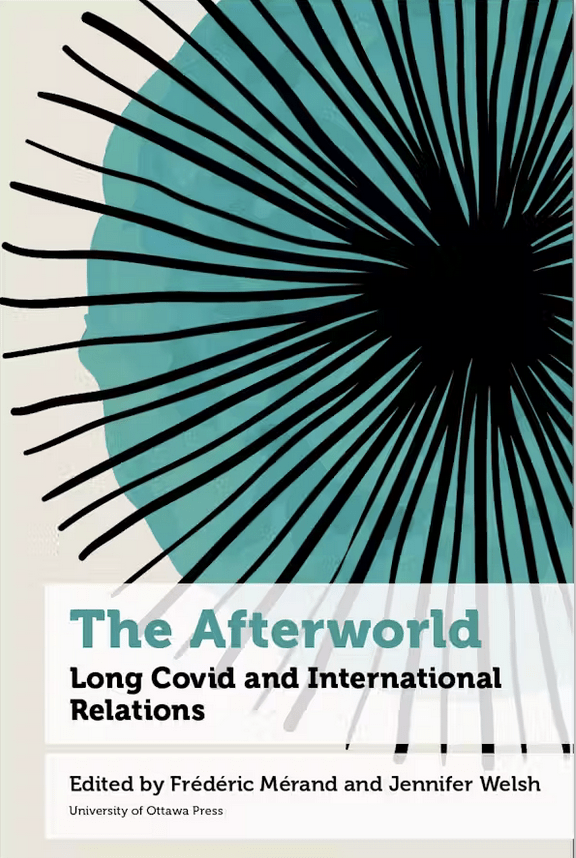‘The Afterworld’: How COVID Impacted a World Afflicted by Pre-Existing Conditions

The Afterworld: Long Covid and International Relations
Edited by Frédéric Mérand and Jennifer Welsh
University of Ottawa Press/April 2024
Reviewed by Dr. Stanley Kutcher
December 18, 2024
The past, what it was and how it impacts the present can be viewed through many lenses. That’s especially true of a global pandemic that left no-one on Earth unaffected. The Afterworld conveys that symphonic effect of multiple narratives very well.
Our understanding of the past and its impact on the present also depends on the perspective of distance. The passage of time allows us see things that may not have been immediately apparent. This book also underscores that reality.
Indeed, the foreword, written by former Foreign Affairs Minister Stéphane Dion and likely only about a year old, could now be read as overly optimistic; a rose-colored-glasses view that may prevent us from acting quickly to effectively address the threats to democracies that the COVID pandemic accelerated — including the threat to the internal stability and dedication to science-based health interventions presented by the toxic populism and anti-expertise propaganda currently contributing to the implosion of the world’s most powerful democracy from within.
But The Afterworld provides a comprehensive report from multiple angles — public health, political, geopolitical, human rights, security — of how the epic polycrisis of a deadly global pandemic disrupted other, determinative global narratives. The 50 chapters — all contributed by Montreal University professors at the top of their fields — are all well written and the authors have done their homework.
This is a book that the reader can address cover to cover in one go, or dip into various chapters as their interests dictate. As such, it is a valuable addition to the literature on the varied international impacts of the COVID pandemic. It’s also a useful resource and solid stimulus to direct more research.
The Afterworld provides a comprehensive report from multiple angles of how the epic polycrisis of a deadly global pandemic disrupted other, determinative global narratives.
But taken as a whole, the book raises important and disquieting questions. Has the World Health Organization (WHO) lost legitimacy and effectiveness as a global public health agency? Is the WHO, as currently structured, fit for purpose and up to the task for which it was established? Have the organizations upon which transnational governance relies lost their capability to frame and support the rules-based international order? How has the rise to power of non-state actors that the pandemic accelerated contributed to anti-democracy trends in the global geopolitical landscape? Has the pandemic changed global willingness to engage in solving the “super-wicked problems” that threaten us? How can democracies protect freedom of speech while at the same time mitigating the pernicious impact of commodified disinformation? The pandemic served as a microcosm for these issues.
All in all, this book raises these important questions, and each chapter does an excellent job of providing analysis and insight on the topic at hand. I particularly found the chapters on Peace and Security, Information Technology, and Global Health of greatest value – which reflects my personal interests. Others would have different choices. But I learned much from reading every chapter.
If I have one criticism, it would be that the book is great on analysis but short on solutions. There are post-pandemic diagnostics — immigration, inequality and human rights have all been impacted in the negative — but few specific recommendations on how to implement remedies. Perhaps a focus on solutions was not the authors’ or editors’ intent. Perhaps the solutions are not yet clear, per the value of time passed. But in addition to excellent analysis, we need effective solutions informed by that analysis.
Finding and implementing those solutions in the face of a world order under assault amid the rise of toxic populism and autocratic oligarchy — especially in the United States — is imperative. The Afterworld can inform that process.
Is The Afterworld worth reading? Absolutely. And it should be on all relevant post-secondary reading lists. It provides a public service in terms of both education and as an early panorama from a crucial moment in history.
Dr. Stanley Kutcher is a medical doctor, a fellow of the Canadian Academy of Health Sciences, Professor Emeritus of Psychiatry at Dalhousie University and an Independent Senator for Nova Scotia. He was Director of the World Health Organization Collaborating Centre in Mental Health Policy and Training and participated in numerous mental health initiatives led by the Pan American Health Organization.
